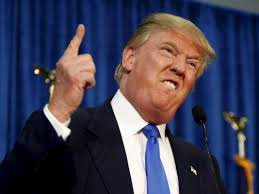Posted on January
20, 2019
As Trump Turns,
Republicans Follow
by
Daniel
Clark
For at least the first year of Donald Trump’s
presidency, his supporters within the Republican Party had a point. Yes, their man is a boor, but just look at
how he was advancing our initiatives. He
proposed and signed an aggressive tax cut package, kept his agreement to
appoint constitutionalists to the federal courts, formally recognized Jerusalem as the capital of Israel, and rolled back
stifling regulations, especially those most noxious ones that emanate from the
scientific malpractice of “climate change.”
 A
defensible argument could be made that these policy outcomes justified the party’s
selling itself out for Trump, in spite of his lack of philosophical grounding,
his propensity to lie, and the fact that several far more reliable candidates
had opposed him in the primaries.
Whether the same argument can be made at the end of Trump’s second year
in office (or “2 Trump” as he’ll call it in his memoirs) is another story.
A
defensible argument could be made that these policy outcomes justified the party’s
selling itself out for Trump, in spite of his lack of philosophical grounding,
his propensity to lie, and the fact that several far more reliable candidates
had opposed him in the primaries.
Whether the same argument can be made at the end of Trump’s second year
in office (or “2 Trump” as he’ll call it in his memoirs) is another story.
Willie
Horton Who?
Inspired by Trump’s pandering to the Kim-and-Kanye
crowd, Republicans passed the First Step
Act, which is so soft on crime and heavy on liberal criminology that the
entire party now owes Michael Dukakis a profuse apology. This bill is based on the liberal premise
that our nation’s relatively high prison population is a large-scale civil
rights violation. This means,
perversely, that our society is unjust because we have been proficient at
locking up criminals. The supposed
remedy to that offense reduces sentences for many federal crimes retroactively,
leading its critics to nickname it the Jailbreak
Act. It also allows inmates to earn
“time credits” toward earlier release by completing “evidence-based recidivism
reduction programming or productive activities.” The law defines “evidence-based recidivism
reduction programming,” but leaves “productive activities” as a conspicuous
elastic clause that may be used to award “time credits” for the flimsiest of
reasons. The Washington Times claims that these “productive activities” include
playing softball and watching movies, and the law does not define the phrase to
those activities’ exclusion.
In truth, the act’s supporters don’t care whether or
not it reduces recidivism, because its intended beneficiaries are illegal drug
traffickers. Clinton administration
attorney general Janet Reno used to distinguish between drug offenders and
“real criminals,” and now, a majority of elected Republicans agree. If these people have been jailed for
something that’s not a real crime in the first place, then who cares if they do
more of the same once they’re released?
Enemies,
anyone?
On foreign policy, Trump is suddenly advocating the
withdrawal of American forces from all corners of the globe. One can debate the merits of leaving Syria,
where Trump’s reasons for committing our soldiers were unclear in the first
place, but our need to remain vigilant in Afghanistan is obvious, yet he’s
promising to withdraw from that country, also.
Furthermore, he has repeatedly voiced a desire to yank our soldiers from
the Korean peninsula, and has pursued talks with North Korea with the potential
to yield that result. A lifelong
Democrat until he started thinking about running for president, Trump frequently
employs the standard Democrat argument that money spent overseas could better
be used on pork-barrel spending projects at home. Through the “peace dividend” model of budgeting,
Democrats view the Pentagon budget as a slush fund for their domestic
initiatives. So, too, does their
Republican counterpart in the Oval Office.
 The
president’s wobbly military commitments are symptomatic of his shocking
inability to comprehend the nature of our enemies. Saddam Hussein was arguably the world’s
leading state sponsor of terrorism, and certainly its leading state sponsor of
Sunni terrorism. His decades-long
pattern of funding, harboring, training and coordinating with terrorists
throughout the Islamic world is a matter of record. Yet Trump imagines that Saddam and al-Qaeda
were mortal enemies, and partly for that reason, he says President Bush should
have been impeached. It might be argued
that such misguided beliefs don’t matter, because Trump has appointed good
people to lead our military, who will talk sense to him when necessary. But then, those good people are resigning at
an alarming rate, in part because he refuses to heed their advice.
The
president’s wobbly military commitments are symptomatic of his shocking
inability to comprehend the nature of our enemies. Saddam Hussein was arguably the world’s
leading state sponsor of terrorism, and certainly its leading state sponsor of
Sunni terrorism. His decades-long
pattern of funding, harboring, training and coordinating with terrorists
throughout the Islamic world is a matter of record. Yet Trump imagines that Saddam and al-Qaeda
were mortal enemies, and partly for that reason, he says President Bush should
have been impeached. It might be argued
that such misguided beliefs don’t matter, because Trump has appointed good
people to lead our military, who will talk sense to him when necessary. But then, those good people are resigning at
an alarming rate, in part because he refuses to heed their advice.
Reds
through rose-colored glasses
Remember when Trump praised the Red Chinese for their
ultra-violent crackdown on protestors in Tiananmen Square? Remember how it didn’t matter, because he
hadn’t been involved in politics at the time?
Now, President Trump says the Soviet Union was right to invade
Afghanistan in 1980. Their motivation,
he says, was that they were defending themselves from terrorist attacks,
something the Soviets never claimed to be the case, and which is not supported
by any historical account.
The Soviets’ aim was simply to spread Communism to
another neighboring country. At the
time, Afghanistan was in its usual state of multi-factional civil war. Moscow had forcibly united the two Communist
factions and given them material support, but when it became evident that they
would not prevail, the Soviets intervened directly. Trump’s excuse reflects a failure to grasp
the nature of Communism, that it requires world domination in order to be fully
realized. No wonder he seems oblivious
to North Korea’s designs on finally conquering the South. How little does Tiananmen Square matter now?
Ideological clarity was never expected of Trump, but
where’s the outrage from his party? How
can Republican politicians and conservative pundits see a headline like:
“Trump: Soviets were right to invade,” and not have to fight each other to be
the first to denounce him for it? Has he
already so thoroughly corrupted them that they no longer have a philosophical
core, or are they simply afraid to subject themselves to one of his allegedly
witty Twitter fits, in which he might cleverly call them a bunch of fat, lying,
stupid little ugly people?
Tariff
Man, without a plan
 Of
course, foreign policy is not supposed to be Trump’s field of expertise; the
economy is. You wouldn’t know that by
the second year of his presidency, which has been characterized most
prominently by tariffs. Defenders of
these tax hikes on consumers of imported goods tend to claim they’re a
necessary evil that Trump is using as leverage, to force other countries to
enact trade practices more fair to the United States. Trump himself has made it clear, however,
that he sees raising tariffs as a good in itself. He’s even declared himself to be a “Tariff
Man,” in caps, just as if he were coining a derisive nickname for a political
rival.
Of
course, foreign policy is not supposed to be Trump’s field of expertise; the
economy is. You wouldn’t know that by
the second year of his presidency, which has been characterized most
prominently by tariffs. Defenders of
these tax hikes on consumers of imported goods tend to claim they’re a
necessary evil that Trump is using as leverage, to force other countries to
enact trade practices more fair to the United States. Trump himself has made it clear, however,
that he sees raising tariffs as a good in itself. He’s even declared himself to be a “Tariff
Man,” in caps, just as if he were coining a derisive nickname for a political
rival.
Trump talks about trade deficits as if they represent
money that certain countries have stolen from others. We import more goods from Mexico than that
country does from us; therefore, they owe us.
If Trump’s tariffs mean Americans buy less Mexican aluminum, then our
trade deficit with Mexico decreases, which he somehow interprets as the Mexican
government handing us a great big bag of pesos to build a border wall. The fact that American manufacturers would
have to pay more to buy their aluminum elsewhere is merely collateral damage.
A few GOP legislators have talked about restricting
the president’s power to impose tariffs, but most other conservatives have
happily gone along with the Trumpian point of view,
even though they obviously know better.
In the early 90s, Rush Limbaugh was a leading proponent of NAFTA, who
spent many broadcast hours logically dismantling the protectionist demagoguery
of the Buchananites and Perotistas. Today, he has no problem with punitive
taxation against American consumers, as he openly declares that he will not
criticize Trump, and publishes a segment in his newsletter purporting to show
that high tariffs have never really hurt anybody.
As other countries retaliated with tariff hikes
against American agriculture, Trump availed himself of a New Deal-era subsidy
program to compensate the farmers for their losses. Is this what suffices for the new trade
policy of the GOP?
Two
more years, Left
 This
dramatic leftward shift has taken place during a year in which the Democratic
Party has held little sway in national policy.
Now that the Democrats have won control of the House of Representatives,
we can only hope that they’ll remain so blinded by their hatred of Trump that
they’ll neglect to take advantage of their many areas of agreement with
him. If, instead, they pass a bill to
fund Trump’s trillion-dollar infrastructure plan, force employers to provide paid
family leave, or give Trump a chance to “stand up to the NRA,” will Senate
Republicans be willing to stop them? The
party’s capitulation to Trump until this point leaves little room for optimism.
This
dramatic leftward shift has taken place during a year in which the Democratic
Party has held little sway in national policy.
Now that the Democrats have won control of the House of Representatives,
we can only hope that they’ll remain so blinded by their hatred of Trump that
they’ll neglect to take advantage of their many areas of agreement with
him. If, instead, they pass a bill to
fund Trump’s trillion-dollar infrastructure plan, force employers to provide paid
family leave, or give Trump a chance to “stand up to the NRA,” will Senate
Republicans be willing to stop them? The
party’s capitulation to Trump until this point leaves little room for optimism.
When it was pointed out to Trump during the 2016
primaries that he’s not a conservative, he observed that the Republican Party
is not called the Conservative Party.
True enough, as far as it goes, but it’s always been understood that Republicans
should be characteristically conservative; otherwise, why should their party even
bother to exist? Abraham Lincoln often
called himself a conservative, and said, “The chief and real purpose of the
Republican Party is eminently conservative.”
Today’s GOP has abandoned that position in order to
embrace Trump, in what is probably the only trade that the Art of the Deal author has gotten the better of so far. Those who were reluctant to adhere to the new
way found that they were no longer welcome in the party. At the convention, Sen. Ted Cruz was
pilloried for his innocuous “vote your conscience” remarks, and even he fell
into line not long afterward.
While they’re at it, the Republicans might as well
trade in their traditional elephant mascot for a rhinoceros, not just because
the entire party is now Republican In Name Only, but because its members have
metamorphosed, just like those people in the 1974 movie Rhinoceros. Those who refuse
to go along have assumed the role of Gene Wilder, shouting defiantly from the
rooftop, while resigning himself to the likelihood that there’s nobody left out
there to listen.
The Shinbone: The
Frontier of the Free Press